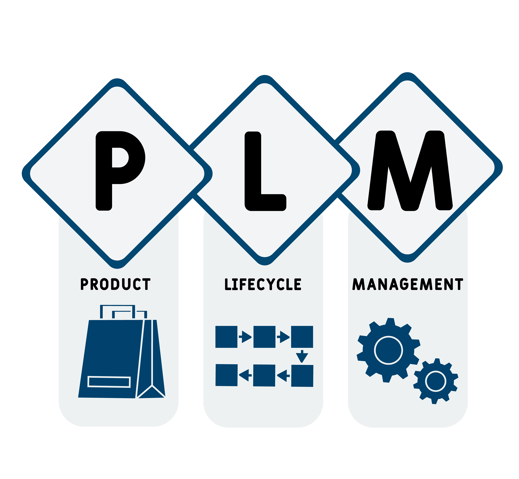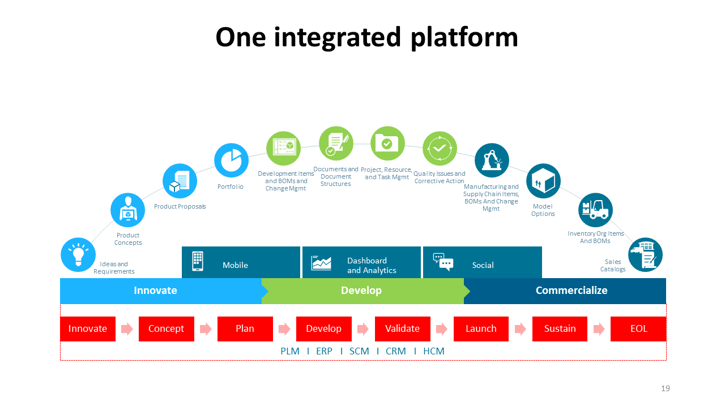Share this
How SCM and PLM are better together
by Meghan Dey on Sep 24, 2021 9:20:56 AM
Many industries have started questioning their methods of operations due to the advantages brought by the emerging technology – allowing your organizations to make faster and better-informed decisions. Previously, all data was scattered across multiple systems, the ideas and product information was saved across spreadsheets, presentations, and emails. Although these solutions had been beneficial in the past, the increasing complexity of products and supply chain methods makes these solutions a great challenge to use.
Today your business requires strategic product innovation, systematic processes, product visibility, and supply chain collaboration to create profitable products and meet customer demands. To achieve all of the above qualities, companies need to think, whether PLM and SCM together can make organizational systems more agile as well as assist in producing higher quality products at a faster rate?

PLM SCM Integration
The rapid, highly innovative future and economic uncertainties require businesses to have supplier communication and presence throughout product innovation, design, and development along with well-functioning operations. It can only be achieved if the two historically separate applications – PLM and SCM – are integrated. They will appear as a single enterprise system – that is the winning part of it.
Importance of bridging the gap between SCM and PLM
PLM and SCM, separately, have proven to be very effective solutions for industries today, but together the two systems can help you achieve more goals and here are the reasons why:
Time Efficiency
One of the main advantages that would come along is time efficiency, as PLM integration accelerates the PLM and supply chain optimization through bidirectional communication between the two systems. For example, if your company changes the design of a product in PLM, no time or effort is wasted trying to ensure the change. It is sent to the supply chain system and updated automatically. The integration saves you time searching for data without having to access multiple separate systems to look for information – minimizing errors and reducing time to market.
Enhanced Collaboration with improved visibility
The value of PLM and SCM is to maintain all-around visibility of the product information. For organizations, it is highly essential to link all their systems to keep the data accurate, clean, and up-to-date. Without true visibility, improving on-time delivery has become a challenge for many.
According to a survey by Oracle, 82% of the customers have succeeded in bringing products to the market in a shorter time. These customers primarily focus on manufacturing innovative products to meet customer demands and are committed to optimizing production and supply chain processes. By integrating supply chain management with PLM, you encourage cross-departmental collaboration to be more efficient as users now have an enterprise view of the product without going to multiple data silos.
Stay ahead of the curve
More and more companies are adopting new technologies to compete with each other to remain on the top. PLM drives innovation for businesses to produce goods that meet growing customer demand. With SCM integration to PLM – the journey from idea to delivery is made effortless. The flexibility to make design changes and push those updates to other manufacturing departments and systems allows you to respond rapidly to external factors affecting your product, such as a change in demand, competitor’s actions and regulations. In addition, operational flexibility and optimized processes lead to a lower cost structure and rapid production of high-quality goods, leading to high-profit margins. These benefits prove that PLM and SCM are great tools, but their value doubles when combined.
GoSaaS & Trinamix
Trinamix, a leader in Supply Chain Management, has partnered with GoSaaS, a leader in Product Lifecycle Management solutions. Both are recognized by Oracle as top system integrators and have an exclusive and dedicated practice with Oracle’s product development and strategy teams. Together, they deliver an integrated SCM and PLM customer experience by implementing Oracle’s Cloud Applications.
Share this
- Oracle Cloud PLM (10)
- "Oracle" (7)
- Oracle PLM Cloud (6)
- logistics (6)
- Cloud Migration (5)
- Cloud PLM (5)
- ERP System (5)
- GoSaaS EG&C (5)
- OTM (5)
- SCM (5)
- "Agile" (4)
- Agile Product Lifecycle Management (4)
- GoSaaS ETS (4)
- WMS Cloud (4)
- supply chain management (4)
- GoSaaS, Inc. (3)
- Integrations (3)
- On-Premise to Cloud (3)
- Oracle E-Business Suite (3)
- Oracle PD (3)
- PLM Cloud (3)
- connected digital supply chain (3)
- "GoSaaS" (2)
- Digital Transformation (2)
- GoSaaS Employee Training System (2)
- GoSaaS Healthcheck (2)
- GoSaaS Integrator (2)
- GoSaaS Migrator (2)
- HR (2)
- High-Tech Industry (2)
- Industry 4.0 (2)
- Manufacturing Industry (2)
- Oracle Agile PLM, (2)
- Oracle EBS (2)
- Oracle HCM Cloud (2)
- Oracle PDH (2)
- Oracle Product Lifecycle Management (2)
- Oracle Product Lifecycle Management Cloud (2)
- Oracle Quality Management (2)
- PLM upgrade (2)
- Semiconductor (2)
- "EG&C" (1)
- "PLM" (1)
- AI (1)
- Analytics (FDI&AI) (1)
- Arena PLM (1)
- Cloud Implementation (1)
- Cloudworld Austin (1)
- ERP Analytics (1)
- GoCompliance (1)
- GoSaaS CRM (1)
- GoSaaS Digital Thread, (1)
- GoSaaS Migration (1)
- GoSaaS PLM (1)
- GoSaaS System Healthcheck (1)
- GoSaaS implementations (1)
- IIoT (1)
- LasVegas (1)
- Life Sciences (1)
- Load Test (1)
- MBX2019 (1)
- Medical Device Industry (1)
- On-Premise (1)
- On-Premise Agile PLM (1)
- Oracle Agile Product Lifecycle Management (1)
- Oracle Business Applications (1)
- Oracle Enterprise Data Quality (1)
- Oracle Fusion Cloud (1)
- Oracle PLM (1)
- Oracle Product Data Hub Cloud (1)
- Oracle Redwood (1)
- Product Value Chain (1)
- Propel PLM (1)
- Security Check (1)
- Smart Technology (1)
- System Healthcheck (1)
- System Review (1)
- Upgrade to Cloud PLM (1)
- Yearly Review (1)
- regulatory compliance (1)
- July 2025 (1)
- June 2025 (1)
- May 2025 (1)
- April 2025 (1)
- March 2025 (4)
- February 2025 (3)
- January 2025 (3)
- December 2024 (5)
- July 2022 (1)
- May 2022 (3)
- March 2022 (1)
- February 2022 (1)
- January 2022 (1)
- December 2021 (2)
- November 2021 (1)
- September 2021 (2)
- July 2021 (1)
- June 2021 (1)
- May 2021 (1)
- April 2021 (2)
- January 2021 (2)
- December 2020 (1)
- October 2020 (1)
- September 2020 (1)
- August 2020 (1)
- June 2020 (1)
- May 2020 (1)
- September 2019 (1)
- June 2019 (1)
- April 2019 (1)
- March 2019 (2)
- June 2018 (1)
